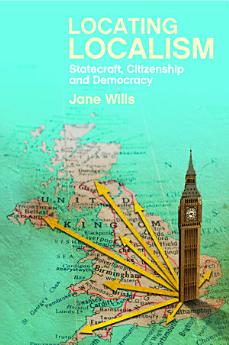Locating Localism: Statecraft, Citizenship and Democracy
জুলাই ২০১৬ · Policy Press
ইবুক
264
পৃষ্ঠা
family_home
যোগ্য
info
reportমূল্যাংকন আৰু পৰ্যালোচনা সত্যাপন কৰা হোৱা নাই অধিক জানক
এই ইবুকখনৰ বিষয়ে
Locating localism explores the development of localism as a new mode of statecraft and its implications for the practice of citizenship. Drawing on original research, Jane Wills highlights the importance of having the civic infrastructure and capacity to facilitate the engagement of citizens in local decision making. She looks at the development of community organising, neighbourhood planning and community councils that identify and nurture the energies, talents and creativity of the population to solve their own problems and improve our world.
Combining political theory with attention to political practice, the book takes the long view of this new policy development, positioning it in relation to the political geo-history of the British state. In so doing, it highlights the challenges of the state devolving itself and the importance of citizens having the freedom, incentives and institutions needed to act.
লিখকৰ বিষয়ে
Jane Wills is Professor of Human Geography, Queen Mary University of London. Her research interests focus on the changing geo-political-economy of work, new forms of urban political alliances including community organising living wage campaigns, and the politics and practice of localism in the UK. She has published widely in the field including, Global cities at work (2010), Union futures (2002), Dissident Geographies (2000) and Union retreat and the regions (1996).
এই ইবুকখনক মূল্যাংকন কৰক
আমাক আপোনাৰ মতামত জনাওক।
পঢ়াৰ নির্দেশাৱলী
স্মাৰ্টফ’ন আৰু টেবলেট
Android আৰু iPad/iPhoneৰ বাবে Google Play Books এপটো ইনষ্টল কৰক। ই স্বয়ংক্রিয়ভাৱে আপোনাৰ একাউণ্টৰ সৈতে ছিংক হয় আৰু আপুনি য'তে নাথাকক ত'তেই কোনো অডিঅ'বুক অনলাইন বা অফলাইনত শুনিবলৈ সুবিধা দিয়ে।
লেপটপ আৰু কম্পিউটাৰ
আপুনি কম্পিউটাৰৰ ৱেব ব্রাউজাৰ ব্যৱহাৰ কৰি Google Playত কিনা অডিঅ'বুকসমূহ শুনিব পাৰে।
ই-ৰীডাৰ আৰু অন্য ডিভাইচ
Kobo eReadersৰ দৰে ই-চিয়াঁহীৰ ডিভাইচসমূহত পঢ়িবলৈ, আপুনি এটা ফাইল ডাউনল’ড কৰি সেইটো আপোনাৰ ডিভাইচলৈ স্থানান্তৰণ কৰিব লাগিব। সমৰ্থিত ই-ৰিডাৰলৈ ফাইলটো কেনেকৈ স্থানান্তৰ কৰিব জানিবলৈ সহায় কেন্দ্ৰত থকা সবিশেষ নিৰ্দেশাৱলী চাওক।







